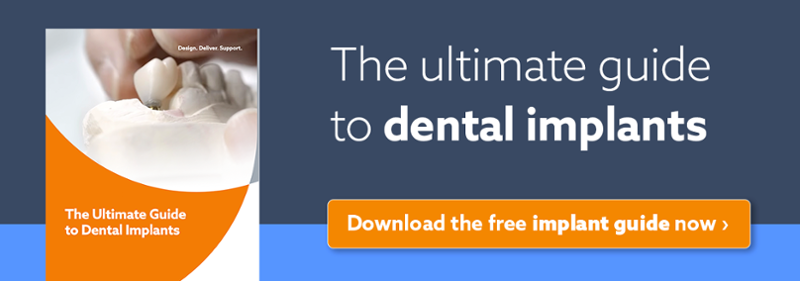Over the past few decades, dental implants have become a reliable way to restore missing teeth. During this period, the materials used for dental implants have been extensively researched and the understanding of how the physical and chemical properties affect the clinical outcome of treatment has considerably improved. These properties include the surface composition and the microstructure of an implant. Ideally, implant materials should be biocompatible and resistant to both corrosion and to fracturing. Implants can be made from titanium or from zirconium. They must demonstrate adequate toughness and strength, and the design of the implant needs to be compatible with its physical properties.

Titanium and Titanium Alloys
Titanium is often regarded as being the ‘gold standard’ for fabricating dental implants and may be commercially pure or an alloy. Commercially pure titanium will usually have trace elements that include iron, nitrogen, oxygen and carbon which improves the mechanical qualities. Titanium alloys are mixed with elements that include aluminum and vanadium. The most common titanium alloy has 6% aluminum and 4% vanadium, and is heat treated to improve its strength, resulting in a low-density material that is resistant to corrosion and fatigue.
There have been some concerns over titanium sensitivity, possibly associated with surface corrosion of implants but much of the literature relates to orthopedic implants. There is little evidence to show allergies towards titanium although some people may have a sensitivity or an allergy to other metals used in alloys. Also, some patients prefer to not have any form of metal in their body. With regards to reactions, it is possible for titanium to cause hypersensitivity in some patients and this can play a role in implant failure. Titanium implant failure due to fracturing is rare and potential causes include the implant design or a manufacturing defect, or non-passive fit of the framework.
Zirconium
Zirconium is a material that can integrate with bone equally as well as titanium and its use eliminates patient concerns about metal allergies or sensitivities. Potential advantages of choosing zirconium include zero risk of corrosion and its use eliminates the possibility of metal showing through the gums or becoming exposed due to gum or bone recession. Zirconium is also thermally non-conductive but it is debatable if a person could actually feel thermal conductivity from a titanium implant. Zirconium has been in use for a relatively short period so its potential for longevity is not yet proven and less is known about the way it is Osseointegrated.
Zirconium implants are made as one piece incorporating the post and the abutment which leaves very little room for error. Healing can be more complicated because the implant cannot be buried underneath the gum tissue and any movement could impede Osseo integration. The implant must be surgically placed at the correct location and angle, and bone volume is critical. Often where bone volume is less than optimal, it is possible to place a titanium implant and a bone graft at the same time, a procedure that would be riskier with a zirconium implant. Zirconium implants, particularly smaller diameter implants, may not be the best choice for patients with heavy function as they have been known to fracture.
The most popular implant components are made of titanium or a titanium alloy, and there are now many people worldwide who have had their titanium implants for many years. That said, some people do have sensitivities or metal allergies and do not wish to take any chances with their implant treatment. For patients in this position, zirconium can be a good option when used in the right clinical situation.
We are here to help. Should you have any questions or want to discuss a specific case, please schedule a call with one of our expert technicians.
Click here to schedule an expert consultation »
